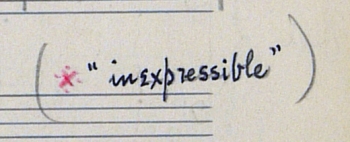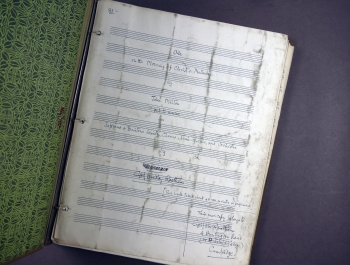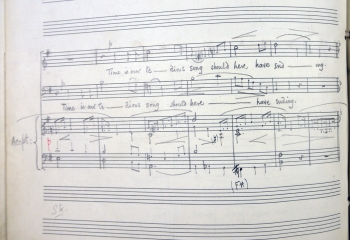Star-led wizards
Cyril Bradley Rootham (1875-1938) was an undergraduate at St John’s, receiving bachelor’s degrees in classics (1897) and music (1900); from 1901 until his death he served as the College’s organist, and the development of his career as a lecturer and as conductor of the Cambridge University Musical Society had a significant impact on music in the University and beyond. The Old Library now holds Rootham’s papers, among them a great many attractive manuscripts of his compositions.
These include a setting of John Milton’s ‘Ode on the Morning of Christ’s Nativity’: a good subject for a December spotlight, whatever one’s inclination as to theological specifics or generalities. The poem’s opening section, introducing the ‘Hymn’ that makes up its bulk, indeed pushes at some boundaries. To invoke the ‘heavenly Muse’ in a Christian poem may not be shocking, especially as the poem explores in part the continuities and tensions between paganism and Christianity. But to ask that poetic inspiration boldly insert itself into the nativity story does seem wilful.
See how from far, upon the eastern road,
The star-led wizards haste with odours sweet:
O run, prevent them with thy humble ode
And lay it lowly at His blessed feet;
Have thou the honour first thy Lord to greet
Nothing indicates humility quite like insisting upon being first in line, although deciding that your poetic efforts deserve a place in a foundational story of your religion comes close. This is not to express disapproval. Rather, it is to stress that Milton’s poem, with its early mention of God’s ‘glorious Form’, partakes (as, for instance, does the later Paradise Lost) of the convention of drawing attention to its own status as an aesthetic event, while also explicitly taking music as one of its subjects and inviting such interpretations as Rootham’s (the original typesetting of which was funded through the receipt of a Carnegie Award).
Divinely-warbled voice
Answered the stringèd noise
*
She knew such harmony alone
Could hold all heaven and earth in happier union
*
Harping in loud and solemn quire
With unexpressive notes, to Heav’n’s new-born Heir
*
Ring out, ye crystal spheres!
Once bless our human ears,
If ye have power to touch our senses so;
And let your silver chime
Move in melodious time;
And let the bass of heaven’s deep organ blow;
And with your ninefold harmony
Make up full consort to the angelic symphony
It would be reductive to say that the music writes itself. Yet what composer with a healthy instinct for the contradictions of humility and ambition could resist inventing a setting for a poem containing such prompts?
 Worth highlighting in the above quotations is the word ‘unexpressive’ (‘in loud and solemn quire | With unexpressive notes’). While ‘expressive’ would nowadays be taken to suggest emotional force and accuracy, Milton is not suggesting that the angelic music lacks these qualities: rather, he says that the notes lack plainness, simplicity. Complexity, not bland vagueness, is his theme: as Rootham notes in his manuscript, the notes are to be considered ‘inexpressible’.
Worth highlighting in the above quotations is the word ‘unexpressive’ (‘in loud and solemn quire | With unexpressive notes’). While ‘expressive’ would nowadays be taken to suggest emotional force and accuracy, Milton is not suggesting that the angelic music lacks these qualities: rather, he says that the notes lack plainness, simplicity. Complexity, not bland vagueness, is his theme: as Rootham notes in his manuscript, the notes are to be considered ‘inexpressible’.
Still, the other sense is not a wholly irrelevant distraction, as the poem’s concluding stanza aims for a self-deprecating fade rather than a triumphant climax:
Hath laid her Babe to rest;
Time is, our tedious song should here have ending:
Heaven’s youngest-teemèd star
Hath fix’d her polished car,
Her sleeping Lord with hand-maid lamp attending:
And all about the courtly stable
Bright-harness’d Angels sit in order serviceable.
Milton concludes with the infant Christ falling asleep at sunrise and being given respite from the poet’s ‘tedious song’. Rootham - perhaps suspecting that a sung reference to ‘tedious song’ so late in a fifty-minute piece might be troublingly bathetic - retains the stanza but appends, as he does elsewhere in the composition, boys’ voices singing ‘Hallelujah! For the Lord God Omnipotent reigneth!’ The Book of Revelation is thus intercut with Milton’s ode, as is Handel’s famous setting of that declaration in the Messiah. Rootham joins Milton in achieving a tone of reverence by gesturing towards its opposite.
This Special Collections Spotlight article was contributed on 9 December 2014 by Adam Crothers, Library Assistant, who also writes about the literary vestiges of St John's for PN Review.


